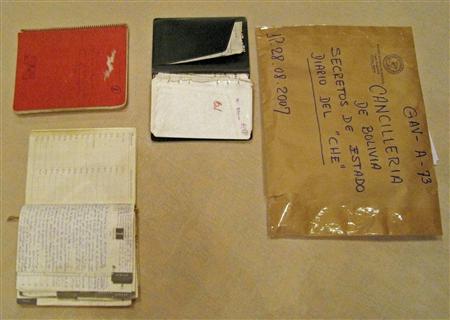
(above) Notebooks of Ernesto "Che" Guevara are displayed in
La Paz, July 7, 2008.
(photo: REUTERS/David Mercado)
Bolivia unveils original Che Guevara diary
July 7, 2008 - Reuters
By Eduardo Garcia
LA PAZ (Reuters) - Bolivian officials on Monday unveiled journals written by Marxist guerrilla leader Ernesto "Che" Guevara during his failed attempt to spread revolution in the Andean country, where he was killed in 1967.
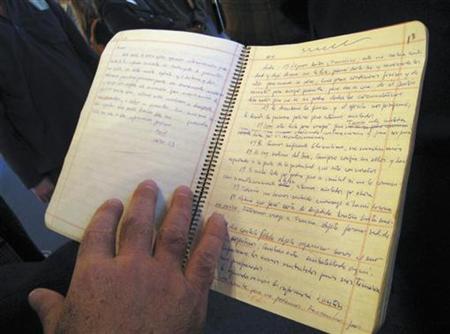 (Right) One of Ernesto "Che" Guevara's notebooks is displayed
in La Paz, July 7, 2008. Bolivia's government unveiled notebooks that belonged
to Guevara on Monday, including the diary he wrote during his failed attempt
to spread revolution in the Andean country. Guevara was captured by CIA-backed
Bolivian soldiers on October 8, 1967, and was shot the next day in a schoolhouse.
(Photo: REUTERS/David Mercado)
(Right) One of Ernesto "Che" Guevara's notebooks is displayed
in La Paz, July 7, 2008. Bolivia's government unveiled notebooks that belonged
to Guevara on Monday, including the diary he wrote during his failed attempt
to spread revolution in the Andean country. Guevara was captured by CIA-backed
Bolivian soldiers on October 8, 1967, and was shot the next day in a schoolhouse.
(Photo: REUTERS/David Mercado)
The Bolivian government had kept the documents in a sealed envelope inside a vault at the country's central bank since 1986. They included a diary that the left-wing icon wrote in two frayed notebooks, along with a logbook and several black-and-white photographs.
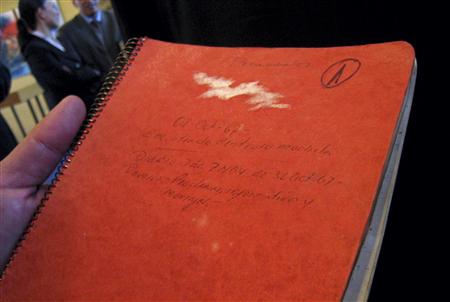 (right) A red notebook that belonged to Ernesto "Che" Guevara
is displayed in La Paz, July 7, 2008. (photo: REUTERS/David Mercado)
(right) A red notebook that belonged to Ernesto "Che" Guevara
is displayed in La Paz, July 7, 2008. (photo: REUTERS/David Mercado)
"Several transcripts of the diary have been published ... but this is the first time the public will be able to look at the handwritten journals," the country's vice minister of culture, Pablo Groux, told Reuters.
Groux said the government planned later this year to publish the diaries, reprinting photographs of every page.
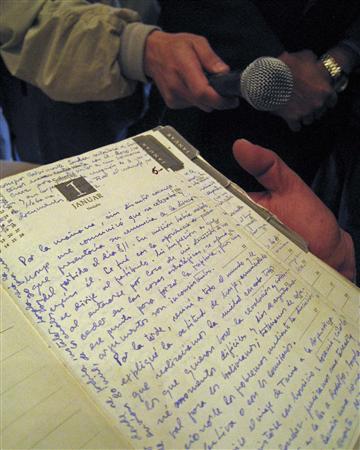 (right) One of Ernesto "Che" Guevara's notebook
is displayed in La Paz, July 7, 2008. (Photo: REUTERS/David Mercado)
(right) One of Ernesto "Che" Guevara's notebook
is displayed in La Paz, July 7, 2008. (Photo: REUTERS/David Mercado)
Bolivia recovered the diaries, which disappeared from an army vault in the early 1980s, when they were offered for sale at an auction in London.
Guevara was known to be a prolific writer and he regularly kept notes of his travels throughout Latin America. His journals inspired the 2004 hit film "The Motorcycle Diaries."
The Argentine-born physician played a key role in the guerrilla uprising that helped Fidel Castro seize power in Cuba in 1959. After holding several government posts there, he set off for the Democratic Republic of Congo in 1965 to spread communism.
His African campaign flopped, and Guevara traveled to Bolivia in late 1966 hoping to spark a revolution there.
He failed to inspire locals to join his cause and was captured and later executed by CIA-backed Bolivian soldiers on October 9, 1967.
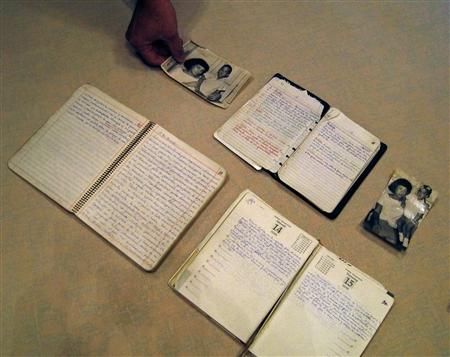 (right) Notebooks of Ernesto "Che" Guevara and pictures of unidentified
people are displayed in La Paz, July 7, 2008. (photo: REUTERS/David Mercado)
(right) Notebooks of Ernesto "Che" Guevara and pictures of unidentified
people are displayed in La Paz, July 7, 2008. (photo: REUTERS/David Mercado)
His stylized beret-clad image has become a widely recognized symbol of the counterculture movement.
(Editing by Hilary Burke and Eric Walsh)